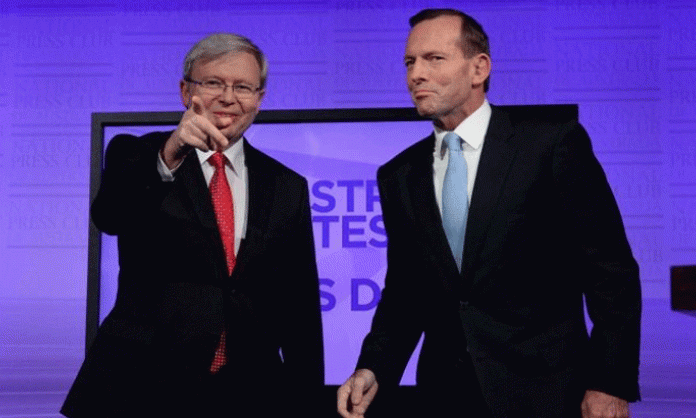Tony Abbott has been reassuring everyone that his will be a “no surprises” government. In a sense he’s right: if the Coalition wins the federal election, it won’t be surprising at all when he and his filth-pot conservative mates start kicking workers and the poor in the teeth.
In May, shadow treasurer Joe Hockey declared in a speech to the Institute of Public Affairs that a Liberal government will usher in “the end of the era of universal entitlement … and the reinvigoration of the culture of self-reliance”.
He wasn’t talking about ending the billions of dollars in government subsidies to mining and energy companies, or stopping the banks reaping billions from dubious fees. He was foreshadowing, as the Financial Review’s Philip Coorey wrote, “drastic welfare and spending cuts”.
In the lead-up to the election, Abbott and Hockey are now saying it isn’t so; we’ve got nothing to fear. But this is the party of the born to rule – the caviar-munching, Gucci Brera two buttoned suit-wearing, silver spoons up their arses la-di-darlings who would have the rest of us on rations of stale bread and warm milk if they thought they could get away with it. Their word means nothing.
That they look on track to win convincingly is a tragedy – and one that was avoidable.
For so long our side has hesitated and wavered. Union leaders have insisted on “boxing clever” – a euphemism for not actually throwing any punches.
By “boxing clever” we have more and more learned to put up with a beating. It’s become so natural that nobody seems to know how to fight any more: the Labor left has disappeared in everything but name, and unions are in their weakest state in generations.
Left and union quiescence has allowed the ALP to shift unopposed to the right. The more it has shifted, and the more passive the union movement has become, the more the conservatives have been able to get a hearing.
Just look at western Sydney. That these North Shore slime suckers might actually pick up seats here is the greatest indictment of Labor – the party that made neoliberal economic policy “common sense”.
The Australian ruling class has made no secret that it wants governments to increase the attacks on workers. The voices calling to ditch penalty rates, to make it easier to sack people, to stop unions getting into workplaces, have been getting louder. The Liberals will be more receptive to those calls than Labor has been. They should be put below the ALP at the ballot box.
But voting is not the most important thing. The choice for election 2013 is about whether we want to be stabbed in the back again by the ALP or punched in the face by the Liberals.
More important than the election outcome will be the extent to which people can mobilise to resist any and every cutback in the coming years. No matter who wins, we can’t just sit and wait for the next attack.
We have to organise now on campuses, among the rank and file in workplaces and in the few campaigns that exist.
If our side continues to avoid the fight, we will continue to lose. There is nothing clever about that.
Better than Labor, but Greens are not the answer
It is understandable that left wing people want alternatives at the ballot box. The Greens continue to be a pole of attraction, having positioned themselves more to the left in this election campaign.
Against the inhuman asylum seeker policies of the big parties, they have attempted to provide a much needed counter-narrative about human rights. They also advocate a range of policies that are more traditionally social democratic, such as lifting the paltry level of the dole and taxing big business to fund social spending.
Yet despite these policies, the Greens are not a genuine left alternative to the ALP. The party does have radical roots in some places. But the years of orienting to parliament, of running local councils and of sitting in committees at a state and federal level have left their mark.
The most damning event in their recent history was signing the deal with Labor in 2010. It was clearly not about advancing a progressive agenda, but simply about getting more power for Greens MPs. Since that time they have done little in office but go along with Labor and tried not to rock the boat.
The great exception was the anti-worker carbon tax. But on that front the Greens were actually the champion of this neoliberal piece of legislation.
Outside of professional politics the party has become increasingly invisible, opting to mobilise members mainly for electoral purposes like letter boxing and door knocking at election time, rather than in progressive campaigns.
And it is most telling that since their arrival as a third force more than a decade ago, as an organisation they have remained aloof from the workers’ movement.
Things would be different if they had a base in the unions and were trying to organise a fightback or having a go at rebuilding a rank and file. But they don’t and they’re not.
So while the Greens should be put above Labor and the Liberals on 7 September, we need to look elsewhere to build a fighting left alternative to the ALP.








